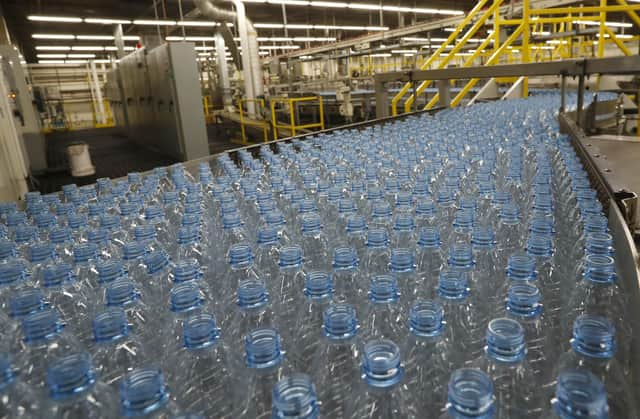Scotland's Deposit Return Scheme (DRS) was due to launch in 2024 - the first in the UK - and with it will come some changes to how we recycle single use drinks containers. It has now been postponed until October 2025.
The scheme has made headlines in the last few months due to its complicated nature, costs involved and potential barriers to trade with the rest of the UK, amongst other things.
Under the DRS scheme, shoppers will pay a 20 pence deposit when they purchase a drink that comes in a single-use container made of plastic, steel, aluminium or glass. They will then be reimbursed when they return empty containers.
Milk cartons, which are made from HDPE – and other non-PET containers - are not included in the scheme and should continue to be recycled via kerbside collection.
The scheme was set to launch on the 16 August 2023, though it has been pushed back to October 2025. There were concerns from the Scottish Government that the scheme could be scrapped due to trade barrier issues with the rest of the UK, whose deposit return schemes aren't due to come into force until 2025.
First minister Humza Yousaf gave the UK Government a deadline of the end of the day on 5 June 2023 to agree to his calls for glass to be included in Scotland’s deposit return scheme (DRS), this was then rejected by the UK Government.
Given its possible implications for businesses in the rest of the UK due to possible trade barriers, Westminster needed to grant the Scottish Government an exemption to the Internal Market Act to allow the Deposit Return Scheme to go ahead.
However UK ministers said this would only be granted if the Scottish scheme does not include glass, leading to Scottish ministers to accuse the UK Government of undermining devolution.

Because of this row of the inclusion of glass, Scottish ministers are currently debating whether or not to scrap the proposed deposit return scheme, a move that seems evermore likely.
Circular economy minister Lorna Slater said this of the latest developments: “Due to the 11th hour intervention by the UK Government to change the parameters, both to remove glass and to add significant uncertainties around essential parts, for example the 20p deposit and the cost to producers and the fees for retailers, it is clear Scotland’s deposit return scheme in the scope and form passed by this parliament cannot go ahead as currently planned.
“Over the last 10 days we have been urgently establishing to what extent there is a way forward for a modified scheme, its scope, terms and timescales.
“The crucially depends on whether the UK Government can provide timely, stable, reliable assurances on basic operational matters such as trading standards, the 20p deposit and producer fees.
“It also depends on industry support for an alternative scheme.
“I am writing to the UK Government today to ask for an urgent discussion about these conditions and I will update parliament at the earliest opportunities on the outcomes and what it means for Scotland’s deposit return scheme going forward.”
Customers will pay an extra 20 pence on single use drinks containers and will then need to return these to a reserve vending machine, found in shops and supermarkets, to get the money back or a voucher, which can be redeemed in shops or else exchanged for cash.
If you order drinks in single use containers online, there will be a take back service. Exact details of how this will work are yet to be revealed.
Under the scheme, any business which produces or imports drinks for sale in Scotland that are sold in the designated single use containers must register directly with the Scottish Environmental Protection Agency (SEPA), the scheme's regulator, or a private non-profit company, Circularity Scotland, that has been set up to administer the DRS on their behalf.
All drinks producers will have a legal duty to comply with the regulations, and it will be an offence to sell a drink in a scheme container in Scotland if the producer of that drink is not registered with SEPA.
Some of the main changes we'll see are: the price of drinks in single use containers going up, a potential reduction or stoppage in kerbside collection, reverse vending machines in shop car parks and retail stores, new barcodes on applicable containers and a potential reduction in choice of drinks in Scotland.
Find out more about the changes we might see here.
Drinks producers and business owners have spoken out about their concerns regarding the scheme in recent weeks and months.
The scheme has come under widespread criticism as critics fear it will cause price hikes and reduce consumer choice, with some producers outside Scotland already ceasing imports.
There has also been widespread critism over lack of information, consultation and costs invovled.
Producers have pointed out that the separate barcodes on drinks being sold in Scotland causes extra costs and will involved more storage space.
Small craft producers have pointed out that the flat fee and costs associated with the scheme will disproportionately impact them.
There's also the complaint that businesses were given a deadline to sign up to a legally-binding agreement, which some say could threaten the future of their business, but if they don't do this, they may not be able to sell their drinks in Scotland.
Trade groups, and some producers outside Scotland, have stated that the scheme will result in fewer products being sold in Scotland due to its complexities, and how it may stifle creativity.
Mr Yousaf was asked how likely the scheme will be scrapped this week (5 June) during a visit to the Scottish Council for Development and Industry in Edinburgh. He said: “It is a real possibility.
“We have heard from a number of Scottish businesses that not including glass puts them at a competitive disadvantage.
“I am not prepared to risk Scottish jobs and investments in that way, so if the UK Government doesn’t see sense, we are in for a challenging way forward.”
Responding to a letter from Scotland’s First Minister to the Prime Minister, Scottish Greens environment spokesperson Mark Ruskell MSP said: “Politicians, businesses and environmental groups up and down the country are rightly furious at the Prime Minister’s failure of leadership and utter disregard for the environment, jobs and investment in the decisions he and his ministers have taken.
“Not only are they at real risk of fatally damaging Scotland’s deposit return scheme, his decision poses a huge threat to future schemes in other parts of the UK.
“There is a potential big prize here for the UK. A full exemption to the power-grabbing IMA would see Scotland go ahead with the scheme which our parliament voted for and which the UKG itself wanted until a sudden u-turn last year. It could be a trailblazer for the UK, an opportunity for shared learning.
“Instead, where we are today blows a huge hole in the environmental and economic case. Arbitrarily forcing Scotland to rule out glass bottles is a two-finger response to cleaner beaches and parks, better recycling and reduced carbon emissions.
“But even worse, the UK Government has imposed a set of half-baked conditions which threaten to keep shifting goalposts at a time when businesses are pleading for certainty. The UK Government is asking the Scottish Government to do the impossible and accept their conditions without knowing what they are.
“These are the actions of the polluter’s party - the party that gives permission for coal mines, that would have us burning oil and gas until the wells run dry, and is content for litter to keep piling up in our parks and streets.
“The Scottish Greens in government offer the other path. We are putting record funding into nature restoration, we are encouraging people back onto public transport through free travel for U22s and cheaper rail, we are consulting on an energy strategy that has a presumption against fossil fuels, and tackling how we heat our buildings.”
He added: “The deposit return scheme was passed by the Scottish Parliament, in the knowledge that the same idea was in the UK Government’s own 2019 election manifesto until it kowtowed to business lobbying last year.
“That’s why I am so angry and disappointed. This is happening not because of the science, or the expertise, or the economy. It is constitutional warfare being waged by the UK Tory Government against Scotland’s Parliament as the Tories burn the house down before being kicked out of office next year. It’s short-sighted political game-playing against jobs, investment and our environment.
“These are dangerous times for democracy in Scotland as a result and the price is being paid by those who may now lose their jobs, the businesses who had invested heavily in doing the right and responsible things, the companies which had made their preparations, and above all, our environment which will be left more polluted and degraded.”
Earlier this year, circular economy minister Lorna Slater stood firm and said that that scheme would "absolutely" go ahead in August, adding it was “all systems go” despite warnings from producers that a “huge number” of smaller drinks firms could stop selling their products in Scotland.
Environment spokesperson for the Scottish Greens, Mark Ruskell, said the scheme was “vital” to cutting waste and said opponents were simply concerned about “party politics”.
He has also spoke out against cross party concern, said: “It is deeply regrettable to see this group of MSPs spreading misinformation and panic about a scheme that our Parliament has already voted for and that is based on successful schemes that have been implemented around the world.
“You expect this level of relentless negativity, half-truths and distortion from the Tories, but to see MSPs from other parties joining them is disappointing to say the least.”
A Scottish Government spokesperson said of the scheme: “We must take bold and ambitious action to tackle the climate emergency. Scotland’s deposit return scheme will be a major part of our efforts to reduce littering, cut emissions, and build a more circular economy when it goes live on 16 August this year. Similar schemes are common in other European countries and have been shown to be very effective.
“The Scottish Government has committed to a pragmatic approach to implementation and to make the scheme more efficient and reduce costs. Ministers and officials regularly meet with industry and will continue to do so as we work together to deliver this scheme."
